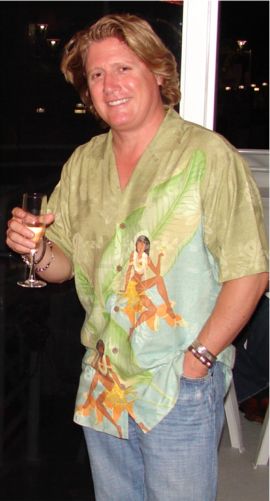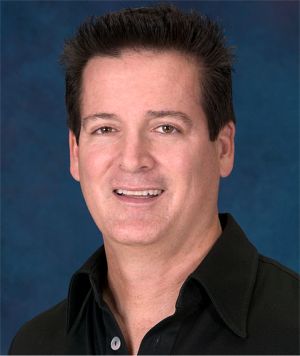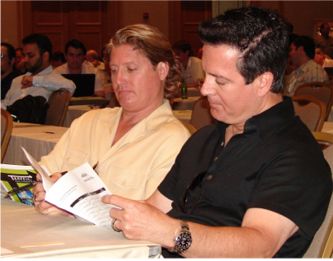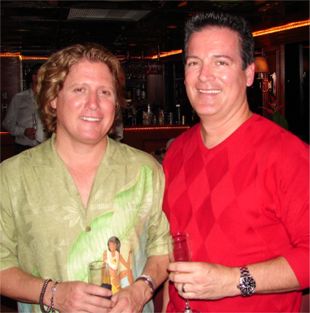|
My
first encounter with them came on the night of October 26th, 2006
on a Florida party boat called the Miami Magic.
TrafficZ.com had booked the boat during the T.R.A.F.F.I.C.
East domain conference to take guests on an evening
cruise on the Intracoastal Waterway. The Castellos would
turn out to be two of the most interesting and instantly
likeable people I have ever met.
I
bumped into Michael first and was immediately struck by the depth
of his knowledge about domains and even more so by his willingness
to share so much information on how to wring the most profit from
developed websites. During our conversation he pointed out his
brother David who was talking with a small group at a table a few
feet away. I took an open seat while David was in the midst of a
discourse that I naturally assumed would be about domains. Wrong!
To my surprise he was regaling his tablemates with a remarkable
account of World War II history! I soon learned that
military history and music were among his greatest passions.
I
had owned a series of record stores before entering the domain
industry so David and I (being relatively close in age)
immediately hit it off trading stories about our favorite
recordings, musicians and concerts through the years. As the chat
turned more personal, I learned where he and Michael had come from
and how their ups and downs had paved the way for the great
success they enjoy today.
|

Left
to right in photo above:
future CCIN CEO Michael Castello,
future CCIN CFO Victoria Castello and
future CCIN COO David Castello |
They
were born in the Little Italy section of the Bronx
in New York City – a neighborhood that spawned Dion
and the Belmonts, Jake “The Bull” La Motta
and the New York Yankees, among others. “The
church (Our Lady of Mount Carmel) you see at
the beginning of the Robert DeNiro movie A
Bronx Tale is where our parents, Aldo
and Victoria were married and where Michael
and I were baptized,” David said. When David was 3 and
Michael 2, their parents moved the family to Boynton
Beach, Florida so Aldo could go to work for Pratt
& Whitney, the company that makes turbine engines
for jetliners.
Aldo
had always loved the aerospace industry and his interest
in the stars spilled over into a fascination with science
fiction. “Dad always found time for us to park at the
drive-in and watch the all night sci-fi movies at the Skydrome.”
Michael recalled. Aldo also loved music and while the boys
were still in elementary school he taught them to play the
traditional Italian musical instrument, the accordion.
Michael was a quick learner, in fact David says he was a
musical prodigy. |
“I
remember him sitting down at our piano and playing the Beatles
Hey Jude by ear when he was nine!,” David
recalled. “My love was writing and research, particularly about
history and archaeology. When I was thirteen, I was excavating Indian
mounds that were to be demolished by hotel developers. Yes, I was
a weird kid! However, when my adolescent hormones kicked in I
decided I stood a better chance of meeting Southern Belles if
I played the drums with my brother instead of showing off my
ancient Jeaga pottery collection!”
Good
choice. By the time they reached high school the brothers had formed
their own rock band, The Flying Tigers. “I played the
electric accordion bass,” Michael said. It became quite the
gimmick. I would play an amplified accordion bass with my left
hand and an organ/synthesizer with the other while performing
songs like The Who’s Won’t Get Fooled Again
and Grand Funk Railroad’s We’re An American Band.
We were so unique that we won the South Florida Battle of the
Bands, which was no small feat for a trio of fifteen and
sixteen year olds. A year later, I switched to guitar.”
David
added “Unlike most of our South Florida peers, we were more into
artists like David Bowie and Aerosmith than KC &
the Sunshine Band. Disco was driving us crazy and I
began to read about bands in New York City named The
Ramones, Blondie, Talking Heads and Television,
and about a club called CBGBs. So we packed up the van and
relocated to live and rehearse in a loft on 30th Street in Manhattan,
around the corner from Madison Square Garden. Blondie
rehearsed on the floor below us and we'd fall asleep listening to
them work on their songs.”

“Our
first day job was as waiters at the Windows on the World restaurant
on the 107th floor of the World Trade Center. The staff would
come to support us when we played at CBGBs and Max’s Kansas
City. Michael and I played the NYC music scene in
various bands for ten years before deciding to relocate to Los
Angeles,” David said. With the move west their musical
careers starting branching off in new directions. David began
promoting rock shows at two famous clubs on the Sunset Strip.
“I promoted hundreds of shows at the Roxy and the Whisky
a Go Go – even broke the attendance record at the Roxy,”
David said. Meanwhile, Michael got interested in sound engineering
and production and his services were soon in high demand.
Michael
said “In the late 80s and early 90s I was intrigued by the idea of digital
recordings. I was one of the earlier producer/artists to
experiment with digital hard disk recording. I was using a
computer that could record 16 channels of music to a computer. It
was very ground breaking in what could be accomplished having
sound in data file form. Of course everyone is doing it these
days, but we were at the beginning of the logic and what could
become of it.”
While
looking for new ways to meld music and technology, Michael started
thinking about how this new thing called the Internet could
be used to build his music business. That sent him down a path
that would totally change his life, as well as David’s.
|

CEO
Michael Castello
Castello Cities
Internet Network, Inc. |
“I
felt the Internet would be a great way to promote
music,” Michael said, “so in 1991 I started a company
named Powwow Productions for the purpose of
promoting my music on the Internet.” He started learning
how to use web tools like Telnet, FTP and Gopher
(a forerunner of today’s modern search engines).
Using the web as a resource he came across the Columbia
University website where he was able to learn how to
write HTML code. Now all he needed was the right domain
name for his new venture and naturally he zeroed in on Powwow.com.
“After
much investigating I found a site called InterNIC.net.
There literally must have been a couple guys managing the .com,
.net, .edu, org and .mil TLD
databases at that time! All I had to do was fill out a
simple form and the name would be mine free! Well, after
six weeks I finally got a reply but my request was
declined. Back then if one word was wrong with the form
they would send the registration back. It took me about
four long months to finally get those guys to give me
Powwow.com so I could start trying to put together my
music site.” |
That
experience in nailing down a domain name had piqued Michael’s
interest though. “Over the next few weeks I started using Telnet
to do WhoIs checks. Just about every domain name was available. At
the time all I needed was Powwow.com but as the months rolled by I
noticed that many of the names I originally checked on were being
registered by others. It dawned on me that I was missing out on something
huge!” Michael said.
“This
was now early 1995 and I quickly sent out registration requests
for PalmSprings.com, Whisky.com and several others.
To my surprise I was the first to register these names but I was
sent an email from the database managers that said I was abusing
the spirit of registering names. I was told that my five names
were enough for my company and I truly thought that I had
overstepped my bounds. I sat back for the next several months
watching as the other top domain names were being snapped up and
in desperation devised a way around my problem by registering
domains under different, but applicable, business names,”
Michael said.
David
clearly remembers Michael’s detour into the world of domain
names. “I remember him telling me that the Internet was the
future in 1992,” David said. However, I was still performing and
promoting, and computers were the last thing on my mind. In
fact, on April 19, 1995 he called me and said, “Did you hear the
news?” I replied, “You mean about the bombing this
morning in Oklahoma City?” Michael said, “No, I
registered PalmSprings.com!” I thought he was nuts!”
|
In
1997, things would take a dramatic turn for both David and
Michael. For Michael, the big event was an entirely new
opportunity in the world of domains. He explained how that
came about. “In the early days domain names was free to
register, it was all done on a first come first serve
basis. Then Network Solutions came into the picture
and started charging $100 per registration as their
fee for managing each name in the database. On principle
alone many of the internet’s early pioneers balked and
refused to pay," Michael said.
“For
me, this presented an opportunity as soon some of the best
names would become available again. I calculated that all
the names that were not paid by July 1997 would be
released back into the registry. I watched as many domain
names were put On Hold for a period of two months, after
which they would be taken from the original registration
holder and given to the next registrant in the cache. The secret
was that very few of us knew that the cache was seven days
long. All I needed to do was find what premium names would
be released, then start sending in registration requests
for those names seven days before the release date,”
Michael explained. |

|
“For
instance, Traveler.com’s expiration date was set for July
19, 1997, so I started sending in registrations from July 12th every
hour, every day. I repeated this technique with many other
names and when that week in July 1997 started, the successfully
registered names started coming in like a slot machine paying out.
I felt like I struck gold! At that time my brother David
was back in Florida helping me send in these registrations.
Between the two of us we locked up such names as Traveler.com, Cost.com,
Rate.com, Sample.com and many others,” Michael
recalled.
David
had gone back to Florida after things turned bad for him in L.A.
After his initial success as a concert promoter he decided to open
his own night club. The venture failed and he wound up losing
every penny he had. Suddenly bankrupt and in dire need of income
he headed back to Boynton Beach in May 1997 and tried his hand at
a number of new occupations. “I tried being a real estate agent
and a commodities broker but neither position lasted more than a week,”
David said. “Even though I was out of the music business, I was
still iconoclastic at heart and the typical corporate
environment was not for me. It was our mother who suggested that I
help Michael with his domain names.”
David
had always loved writing, and during the dark days at the end of
his stay in L.A. he had rediscovered that passion. “I sat
down one night, started typing every day and didn't stop
until I'd finished the manuscript for an historical fiction
novel titled Rabbit On The Moon. For me,
I'd gone full circle.” That writing skill would come in handy in
his new domain partnership with Michael.
|

COO
David Castello
Castello Cities
Internet Network, Inc. |
“As
luck would have it, Michael owned BoyntonBeach.com
and the first pages I created were local history articles
I'd written for the Boynton Beach Times. I
knew nothing about domain names and very little about the
Internet. However, I instinctively equated web
site traffic with ticket sales for the concerts I'd promoted
on the Sunset Strip. To me, a unique visitor was like a
ticket buyer to a show and once the ticket buyers were
inside the concert hall, you wanted them to spend
their money by purchasing as much band merchandise, drinks
and CDs as possible. I also noticed that
BoyntonBeach.com was generating a lot of intuitive
traffic. That got me excited because it made perfect sense
that someone interested in visiting Boynton Beach would go
straight to BoyntonBeach.com," David said.
“I went door
to door and began signing local hotels, shops and
restaurants for $100 a year. I was more interested
in learning about this new medium than making money. In
the summer of 1997, most local businesses didn't
have web sites so I also built them a splash page. I signed
about thirty local businesses and learned the basics of
Internet marketing. |
By late
1997, I was convinced that Geodomains (geographical
domains), particularly those cities with national recognition like
PalmSprings.com, could generate a lot of
advertising revenue if they correctly built upon their intuitive
traffic to promote local businesses around the world.”
Michael
was totally sold on city domains as well, but initially for
different reasons. “I originally had an idea in 1994 that the
World Wide Web should be as virtual a copy of our planet as man
could make it. Years earlier I use to sit in my apartment in New
York while it would rain for weeks and reminisce about sunny
Florida. Before I would go out of my mind I would pack a small bag
and drive to the airport and take a flight down to see my parents.
In 1994 I wondered if there was a way one could virtually reach
out through their computer to visit any place in the world, the
immediacy of it would be profound."
"I
eventually started registering places I liked to visit in California
such as Palm Springs, Laguna Beach and Pebble
Beach with the intention of creating as much feel as I could
for that city or place. In the coming years I realized just how
much others felt like me. It was very gratifying to have been able
to bring other visitors to these virtual cities that I journeyed
along and created in this new virtual world.”
While
Michael had that vision of building virtual cities, David, by
necessity, focused on the financial aspects of this new
opportunity. “Even though I was quite ignorant about the
Internet, I quickly envisioned a way to monetize
BoyntonBeach.com. To my brother's credit, he let me run with the
ball and go with my marketing instincts. After I learned the ropes
with BoyntonBeach.com, I was ready to move on to our most
popular Geodomain. That was, and still is, PalmSprings.com, but it
meant I would have to gamble everything and relocate back
to California,” David said.
|
“Again,
it was our mother who came up with a strategy
(Editor’s note: Victoria Castello is now the
Chief Financial Officer for Castello Cities Internet
Network). She's been a Florida real estate broker for over
thirty years and was impressed by the large number of
inquiries coming in through the real estate section of
PalmSprings.com. She suggested that I fly out to Palm
Springs for two days and offer our real estate section to
a broker for $15,000 a year. I nearly died. In
those days I was barely getting $100 a year from an
advertiser on BoyntonBeach.com.”
“On
December 14, 1997 I flew out to Palm Springs and walked in
cold with my laptop to see every real estate broker in
town,” David said. “Some laughed - one even said,
"I wouldn't give you ten cents!" - and
some were interested, but no one was buying," David
said. |

Michael
(left) and David Castello
at the 2006 Moniker.com/T.R.A.F.F.I.C. East
live domain auction in Hollywood, Florida |
"The
next day I had the same reaction and was ready to fly home when a Coldwell
Banker broker recommended I speak with a popular Re/Max
broker with 135 agents twelve miles away in Palm Desert.
His name was Lorenzo Lombardelli and when I walked into his
office he said "You have sixty seconds. Go!" By the end
of that minute he agreed with my assessment of PalmSprings.com
and signed a two year contract. I flew back to Florida, packed up
the T-Bird and arrived in Palm Springs on March
1, 1998. In my first eighty-eight days I signed ninety Palm
Springs businesses and we never looked back!” David said.
Their
success with city domains (they own more than 100 of them in .com)
eventually led David and Michael to join Associated
Cities in 2004, a very successful organization that
has managed to get city domain owners from around the world to
join forces to jointly promote member sites. They now sit on the
board of directors with guys Michael first heard about years
before.
“Back
in 1995 I was interested in acquiring as many city names as I
could and was watching names like LosAngeles.com, Denver.com
and Dallas.com, hoping that they would expire. At some point
in 1996 the owners apparently put these city names up for sale.
I missed that opportunity, but Dan Pulcrano was watching
and grabbed them. He really hit paydirt on that one! In 2002 we
met him for lunch in Los Angeles and exchanged ideas.”
David
noted “Guys like Dan Pulcrano (SanFrancisco.com), Sean
Miller (NewYorkCity.com), Skip Hoagland and
Mike Ward (Atlanta.com) and Josh Metnick (Chicago.com)
blazed their own paths to glory and were quite self-sufficient
long before they joined Associated Cities. It is for that
reason that the sharing of creative ideas seems to resonate
stronger there than with most organizations.”
|

|
Michael
added, “Associated Cities helps .com city owners work
with those of us that have found successful formulas to
make money from our sites. We virtually want to connect
the city dots that will create a world picture for the
visitor. We do extremely well with our sites both locally
and globally. Why not show what we have perfected over the
last eleven years to other city owners to help them make
money?" |
"The
beauty of exchanging ideas with another .com city owner is that
our city markets don’t compete. Different city owners with
differing personalities make each site look unique. For example,
look at our Acapulco.com
and Sean Miller’s NewYorkCity.com.
Their looks are different but very appealing, efficient and
profitable," Michael said.
Next
Page:
-
What
They Plan for Their Generic Gems
-
Can
You Duplicate Their Success? They Say Yes!
-
Their
View of the Future for Domains and the Internet
-
Why
Their Partnership Has Endured Through Thick and Thin
Continue
to Page 2
|











